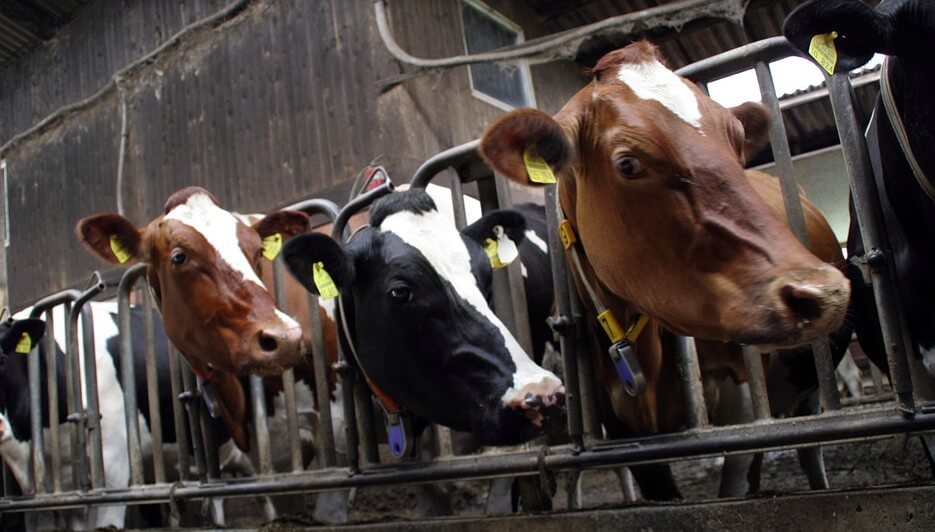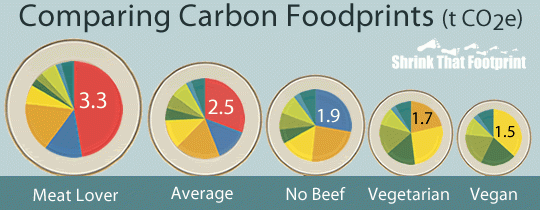People go vegan for 3 main reasons:
- Ethics
- Health
- Environment
Some go vegan for a combination of those.
I’m going to summarize the main case for each category to help you understand each motivation.
Ethical Reasons To Go Vegan

While you hear a lot of vegans going back to eating meat, ethical vegans rarely ever do.
As the name suggests, an ethical vegan believes that it is wrong to make animals suffer unnecessarily.
Among other things, they recognize that:
- Animals feel pain (and conversely joy)
- Animals want to live (and many animals like cows are friendly)
- Just because most people are smarter, it doesn’t give us the right to “play God” and use other sentient beings as we wish
There are many misconceptions about animal agriculture that stop many people from adopting a vegan diet (or slows them down).
Common Misconceptions and Questions
Before going vegan, every ethical vegan will start with questions (and finding answers).
It might start by considering why you likely feel it’s wrong that some countries still eat dogs, and how is that different from eating a cow or pig.
Here’s a collection of questions that I’ve answered in detail. They are based on hard facts and research whenever possible:
- Do animals feel pain when slaughtered? – In theory, it could be done painlessly. In reality, you have lowly paid workers killing animals on a massive scale and cutting corners. A large portion of livestock suffer when killed.
- Do cows and pigs have happy lives on farms? – 99% of animal agriculture takes place on factory farms. These are not happy places. Animals are crammed together in terrible conditions and treated like garbage (even on “humane” free-range farms).
- Do dairy cows have to be pregnant to produce milk? – Dairy cows do need to get pregnant to start lactating. After giving birth, they will continue to produce milk for a while. Once quality and quantity drop, the cow is given a short resting period before being forcefully inseminated again. Essentially, the cow is repeatedly raped and used as property (women seem to make the connection of how messed up this is easier than men).
- Are cows happy being milked? – Dairy cows have been bred to massively overproduce milk to the point that it causes health issues. Milking them can cause relief. I wouldn’t say they’re “happy”, but they don’t hate it either in the majority of cases.
- Why don’t vegans consume milk and cheese? – While dairy cows aren’t immediately killed for food, they are still treated poorly. Most importantly, they are killed when they are still young.
- How smart are animals that people eat? – I’ve written detailed posts on the intelligence of cows and if pigs are smarter than dogs that review all the research done on this subject.
- What about non-mammals? – The science is still unclear on if animals like fish and clams have brains (or feel pain). Vegans take the “safe” side of the argument because there’s a chance that they do suffer. Even insects are considered animals and may feel pain.
As you learn about these things, it’s pretty common (and normal) to feel guilty about not going vegan. It’s scary, but if you think it’s the right thing to do, you’ll need to find a way to make a change.
Health Reasons To Go Vegan
You can’t really eat too many vegetables, so unless you’re a junk food vegan, a vegan diet is going to be pretty healthy. In general, vegans are healthier than meat eaters.
However, even though some will claim that an omnivorous diet can’t be healthy, that’s not true. Research seems to be showing that you don’t want to eat a lot of red meat, but some fish once in a while would be beneficial for many.
Many people who go vegan for health reasons (or to try and be more attractive) in the first place eventually realize this, and often go back to eating animal products (although maybe as a vegetarian or pescetarian).
With that being said, there are certain conditions where vegan diets are prescribed as treatments, and research shows that vegans are generally more healthy in other ways.
- Vegan diets can help treat autoimmune disease – Several studies show that a vegan diet can help manage symptoms of autoimmune diseases like rheumatoid arthritis, and related conditions like ulcerative colitis. The evidence is pretty strong (compared to trying something like a paleo diet to treat autoimmune issues).
- Vegan diets may protect against cancer – There’s quite a bit of research showing that vegans have a significantly lower chance of getting most types of cancer.
- Meat eaters are generally fatter than vegans – Obviously there are many exceptions to this, so it’s not a “rule” of any kind. But if you take an average meat eater, and an average vegan, the vegan is a healthier weight (by far).
- A vegan diet may help eczema – Eczema flare ups can be caused by a variety of reasons. Some of those are related to diet, and a vegan diet may help for certain people.
- Vegan diets may be useful to treat fatty liver disease – Pretty much any healthy diet helps treat fatty liver disease, but vegetarian diets have shown a lot of promise in studies.
- Vegan diets generally lower triglyceride levels – Not all vegans have low levels of triglycerides, but more so than the general population. They also usually have lower cholesterol levels.
What about muscle building?
One thing that stops many people from going vegan, particularly men, is we’ve been told all our lives that we need meat for athletic reasons.
Even I believed this, and since I was pursuing a professional soccer career, it took me a long time to go vegan.
But there are many high level vegan bodybuilders, strongmen, and professional athletes. As long as you’re getting enough protein as a vegan, you’ll be able to build muscle just as easily as a meat eater.
Many NBA players have also claimed that going vegan reduced inflammation and increased their energy levels.
Environmental Reasons to Go Vegan
Obviously climate change is a huge concern for humanity as a whole.
There are many ways to reduce your personal impact (even small things like recycling peanut butter jars properly), but for most, going vegan is the single most effective change you can make.
Animal agriculture produces a high proportion of global emissions.
It’s not surprising that vegan diets have the lowest carbon footprint of any diet type.

Animals take a lot of space to raise (even when they’re crammed together in factory farms).
You also have to feed them for a long time.
If people just ate the vegetables grown for livestock, we’d be able to reduce or eliminate food insecurity around the world, while also slashing emissions.
This is not the primary reason I went vegan, but it’s a nice benefit.
Interested In a Next Step?
If any of the above seems to make sense to you, I’d encourage you to keep asking questions and finding answers.
There’s some solid logic behind all of these, but going vegan is a big change and it often requires a lot of thought over a period of time.
You’ll have to fight against many inherent biases, and face some uncomfortable feelings.
If you do end up wanting to go vegan, my step by step guide to going vegan may be useful.